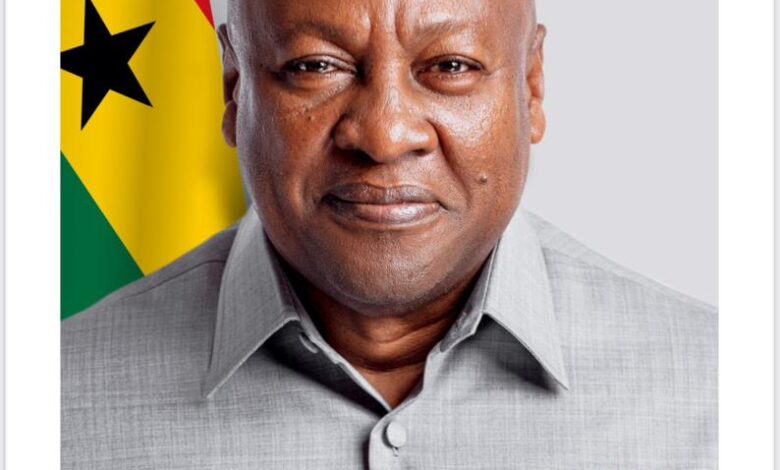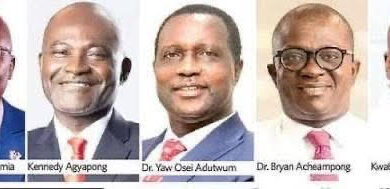Review the Number and Names of Ministries from 23 to 19 – Patrick Apoya and Sadick Sam to John Mahama
Review the Number and Names of Ministries from 23 to 19 - Patrick Apoya and Sadick Sam to John Mahama

Chairman, SkyFox Ltd and a development worker with over 20 years of experience in the management and coordination of governance and community-based health, water, sanitation, and agri-business programs, Mr. Patrick Apoya and one Sadick Sam have called on His Excellency, President of the Republic of Ghana, John Dramani Mahama to review the number and names of ministries further from 23 to 19.
The two in a Memorandum addressed to President Mahama commended him for the significant efforts his office had made in reducing the number of ministries from 30 to 23.
“We sincerely commend and acknowledge the significant efforts that your government has made in reducing the number of ministries to 23. However, we believe that there is potential for further improvement and respectfully request that Your Excellency consider the following proposal which outlines a plan to further streamline the ministries, reducing the number from 23 to 19” part of the Memorandum read.
Below is the full Memorandum.
Memorandum
To: His Excellency, The President of the Republic of Ghana
From: Sadick Sam and Patrick Apoya
Date: January15, 2025
Subject: Revision to the Number and Names of Proposed Ministries
We sincerely commend and acknowledge the significant efforts that your government has made in reducing the number of ministries to 23. However, we believe that there is potential for further improvement and respectfully request that Your Excellency consider the following proposal which outlines a plan to further streamline the ministries, reducing the number from 23 to 19.
Guiding Principles
- Ensure proper alignment and avoid duplication to achieve greater efficiencies
- Simplicity is golden: There is beauty and messaging value in being succinct in naming ministries.
- Avoid, as much as possible, naming ministries that are of cross-cutting nature and project-related themes
- Data consistency is key to achieving better planning and governance outcomes: Recognize constant change of names of ministries has implication on data analysis, planning and smart decision making.
- More and bigger is not always better and effective: More ministries mean more public expenditure that may not translate into better performance
- Every cedi saved counts! Recognize that there is cost implication every time names of ministries are changed
- Better late than never, if a late fix will inure to the wider public benefit of a country
Proposed List of Ministries
- Ministry of Finance
- Ministry of Health
- Ministry of the Interior
- Ministry of Defense
- Ministry of Education
- Ministry of Energy
- Ministry of Transportation
- Ministry of Youth Development and Sports
- Office of the Attorney-General and Ministry of Justice
- Ministry of Lands and Natural Resources
- Ministry of Local Government, Chieftaincy and Religious Affairs
- Ministry of Foreign Affairs
- Ministry of Communication
- Ministry of Environment, Science and Technology
- Ministry of Works, Housing and Water
- Ministry of Tourism, Culture and Creative Arts
- Ministry of Labour, Employment and Social Welfare
- Ministry of Food, Agriculture and Aquaculture
- Ministry of Trade and Industry
Rational for Proposed Changes and Key Actions
| No. | Proposed Change | Rational | Key Actions |
| 1. | Removal of Green Transition from Ministry of Energy | Green transition is a project and need not be part of the name of the ministry.
|
▪ Create a Directorate for green transition at the ministry and provide adequate budget and incentives to realize this objective. This Directorate would be the interface between the Ministry and the international community and the various Conference of Parties (COPS) of the UN.
▪ Embark on education and sensitization programs on the benefits of green transition and sustainability to enhance adoption of green technologies and reduction in carbon footprints ▪ Engage the international community to support various pathways and programs that government is adopting to reduce the effects of climate change, and achieving net-zero emissions by 2050 |
| 2. | Merger of the Ministry of Roads and Highways with Ministry of Transport and rename it as Ministry of Transportation | There is ambiguity and redundancies in the current arrangement.
|
▪ Place all forms of transportation under one roof to ensure synergy and value for money. Rail travel goes with Rail track development, road transport goes with roads and highways, and aviation goes with all the associated aviation infrastructure. |
| 3. | Merger of the Ministry of Sports and Recreation and Ministry of Youth Development and Empowerment and rename it as Ministry of Youth Development and Sports | Youth development embodies empowerment and recreation. Programmatic aspects should be mainstreamed across all relevant ministries, including health, education, water resources, defense, labor and employment etc.
|
▪ Provide the proposed Ministry of Youth Development and Sport with resources to develop and manage recreation, youth development and empowerment programs.
▪ The Ministry of Youth Development and Sports should work in tandem with the Ministry of Labour and Employment to provide visible opportunities for youth development and employment |
| 4. | Renaming of the Ministry of Communication, Digital Technology, and Innovations as Ministry of Communication | Apply the principle of simplicity and consistency in naming ministry. Digital technology as a pillar in the communication spacer does not need to be part of the name of a ministry. | ▪ Transfer leadership on Innovation to the Ministry of Environment, Science and Technology to lead the innovation process |
| 5. | Removal of Ministry of Gender, Children and Social Protection from the list | This is a crosscutting issue that that needs to be mainstreamed into operations of every ministry.
|
▪ We recognize the political dimension of gender, and without diminishing the value of piercing advocacy of gender activists, gender issues from pure policy, planning and effective governance perspective are better addressed as cross-cutting issues as opposed to concentrating in a single Ministry. We are therefore proposing the following:
▪ Set up a desk at the presidency to coordinate and mainstream gender into policies and programs and budgeting process of all Ministries ▪ All Ministries to establish gender desks to oversee the mainstreaming of gender issues in their sector policies and programs. ▪ Transfer child protection roles and budget to DOVSU ▪ Strengthen other programs of Children such as those at the Ministries of Education and Health ▪ Transfer social welfare component (e.g. LEAP and Disability issues) to Labor and Employment. ▪ Create a Directorate at the Ministry of Labor, Employment and Social Welfare to oversee all social protection schemes. ▪ Assign the minister designate for Gender, Children and Social Protection as Lead for the proposed Gender Desk at the Office of the presidency |
| 6. | Renaming Ministry of Labour, Jobs and Employment as Ministry of Labour, Employment and Social Welfare | Apply principle of consistency. Adding jobs to the name does not add any additional value. | ▪ Include and emphasize “Jobs” in the mandate of the Ministry of Labour and Employment
▪ Ensure job creation is a key pillar in the Ministries policy frameworks ▪ The Ministry of Labour, Employment and Social Welfare and Ministry of Youth Development and Sports should partner with the Ministry of Communication or NCCE to sensitize the private sector on policy incentives and the public on job creation efforts and opportunities |
| 7. | Place Ministry of Fisheries and Aquaculture under Ministry of Food, Agriculture and Aquaculture | The merger is expected to bring complementarities and synergistic value, ensuring sustainability in the food value chain
|
▪ Move Fisheries to Lands and Natural Resources (along with Water Resources Commission). This brings all natural resources under one umbrella (Land, Forestry, Water resources, Minerals, Fisheries etc.). Each of these already have existing commissions for programming such as fisheries commission, Lands Commission, Minerals Commission, Forestry Commission and Water Resources Commission. Note that water supply remains with Works and Housing
▪ Establish a Directorate for Aquaculture at the Ministry of Food, Agriculture and Aquaculture |
| 8. | Renaming Ministry of Trade, Agribusiness and Industry as Ministry of Trade and Industry | Apply the principle of consistency cost saving. Agribusiness is a cross-cutting issue and its removal from the name of the ministry will not diminish the work of the ministry | ▪ Emphasize agribusiness in the mandate of the Ministry of Trade and Industry and Ministry of Food, Agriculture and Aquaculture. We need enterprise approaches in the Ministry of Agric as much as in the Ministry of Trade.
▪ Appoint a Lead at the Presidency to coordinate agribusiness policy development and program implementation. |
| 9 | Renaming the Ministry of Works, Housing and Water Resources as Ministry of Works, Housing, Water and Sanitation | Apply the principle of consistency and proper alignment | ▪ Water Resources currently embodies (i) Water Resources Commission responsible for managing the Country’s fresh water resources and (ii) Drinking water supply for rural and urban areas spearheaded by CWAS and GWL respectively. We propose the
▪ Move the Water Resources Management component to the Ministry of Lands and Natural Resources better alignment between forestry, mining and water resources protection under one umbrella. ▪ To keep data consistency in WASH programming keep drinking water supply and sanitation together, under the Ministry of Works, Housing, Water and Sanitation ▪ Sanitation is linked to housing, and also linked to water supply and should always be programmed together. ▪ District Assemblies keep the responsibility for service delivery of sanitation, whilst the Ministry takes over the policy making responsibilities of the erstwhile Ministry of Sanitation and Water Resources. |
Next Steps
- We respectfully suggest that in addition to the above changes, consideration be given to streamlining ministries with a focus on implementing strategic and structural reforms, particularly, in larger ministries to re-align systems to minimize redundancies, improve productivity and reduce their financial burden on the national budget.
- Recognizing that ministers have already been appointed for ministries that within this proposal, have either been merged or removed, we recommend that ministers designate for Ministry of Roads and Highways, Ministry of Youth Development and Empowerment, and Fisheries and Aquaculture be re-assigned to serve in other portfolios and capacity that His Excellency the President may find appropriate without compromising the Guiding Principles of this proposal in the immediate term.
- In the long term, government engages key stakeholders to agree on the names and number of ministries that successive governments will need to maintain and pass a law to ensure consistency and stability on names of ministries.
- Additionally, we urge government to embark on a bold transformational agenda to improve service delivery at all levels of government including but not limited to:
- shaping the mind set of government employees to be professional and ethical
- developing a culture of excellence
- reviewing policies and processes to achieve efficiencies
- clearly defining roles and service level expectations
- reviewing and strengthening the practice requiring public sector organizations to sign performance agreements
- providing adequate resources, tracking performance, and rewarding excellence.
Patrick Apoya is a development worker with over 20 years of experience in the management and coordination of governance and community-based health, water, sanitation and agri-business programs.
He has conducted and coordinated several monitoring and evaluations, and led and participated in various scientific and socio-economic researchesin hisareas of expertise. He has developed and tested various training modules for the training of community-based health and hygiene personnel., and has coordinated the development of business strategies and plans for international clients such as WaterAid, CARE International, African Civil Society Network on Water and Sanitation (ANEW) and the Ethiopian WASH Newtork. Patrick also has worked as a consultant for international clients in several African countries including Ethiopia, South Sudan, Uganda, Kenya, Sierra Leone, Nigeria, Zambia, Senegal and Benin among others.




